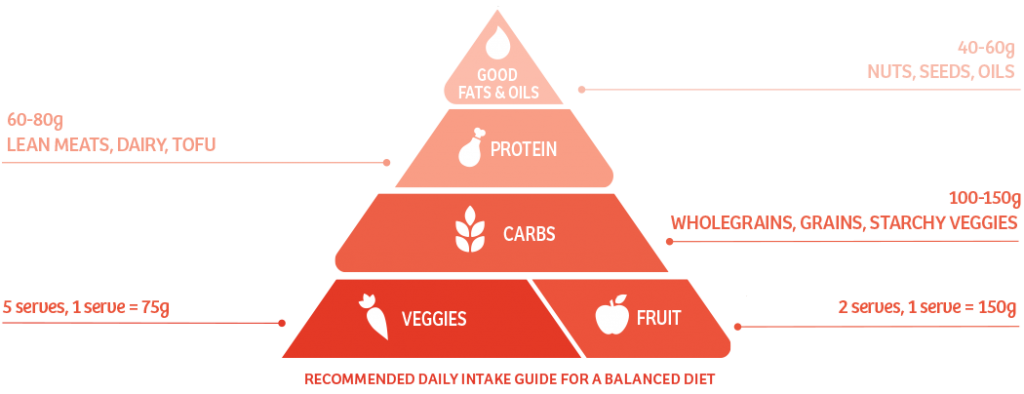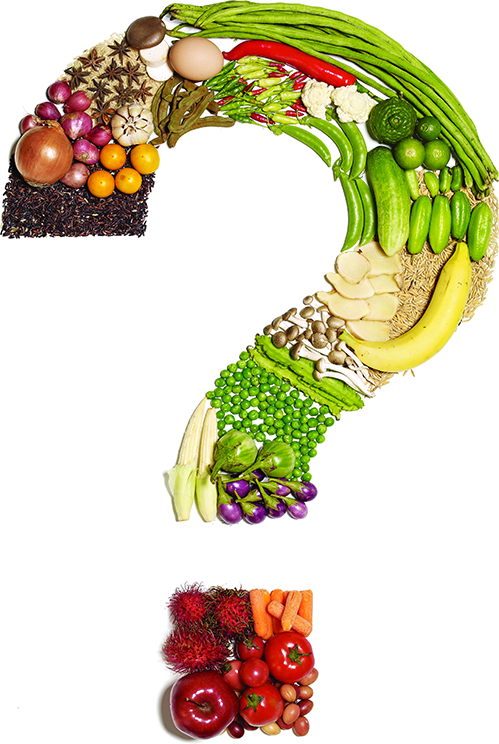Nutrition For You
Eating a nutritionally balanced diet is as simple as eating the healthy foods we need, in the right amounts. At Lean Cuisine®, we are committed to Simple Balanced Nutrition. We believe in eating according to the recommendations of the Healthy Eating Pyramid, and a healthy diet, with a balance that includes all food groups that will help you to look, feel and perform at your best every day.

The Healthy Eating Pyramid at a Glance

The 5 Food Groups
The Healthy Eating Pyramid guides us in consuming a simple ratio of mostly veggies, some fruit, carbs, protein and good fats and oils. This reliable way of eating takes the guesswork out of healthy eating.
The Healthy Eating Pyramid explained…
Why do we need good fat?
Fats form part of every cell in our bodies, and they are especially important for nerve cells, our brains, and the production of many necessary hormones. The body also uses stored fat as an important source of energy, providing double that of the same amount of carbohydrate or protein. Fats also provide the fat-soluble vitamins A, D, E, and K.
Two other types of fats that we hear a lot about and which are especially important to consider are the Essential Fatty Acids (EFAs). EFAs are types of unsaturated fats, commonly known as omega-3 and omega-6. They are essential for healthy development of the brain, eyes as well as forming a structural part of every cell in the body. Despite our often high-fat diets, many people have a low intake of these essential nutrients. The main sources for omega-3 is cold-water fish (such as salmon and sardines), flaxseeds and walnuts while omega-6 is found in seeds, nuts and their oils.
Examples of 1 serve (~10g) of Good Fats and Oils are:
- 10g fat / serve
- 30g mixed nuts
- 2 tsp. oil (10g)
- ¼ avocado
- 2 tsp. margarine
- 1 tbsp. nut spread
What is protein?
Protein per gram contains 4 calories of energy per gram, the same as carbohydrate, and is found in largest amounts in animal foods including meat, chicken fish and dairy as well as in smaller amounts in soy nuts and whole grains. Protein, unlike carbohydrates primarily has a functional role in the body and is used for muscle repair, to build skin and hair and to provide essential amino acids that are involved in a number of chemical processed in the body. As proteins are not primarily used as a fuel source, they are also digested after carbohydrates and hence thought to play a powerful role in inducing feelings of satiety or fullness.
How much protein do I need?
It is recommended that Australian adults consume 1g per kilo of body weight of protein each day. For the average adult this translates into 60-80g of protein each day. In the Healthy Eating Pyramid, a recommended amount of protein can be obtained via 2-3 serves of lean meat, chicken, fish or meat alternatives along with 3-4 serves of calcium rich dairy or alternatives.
Examples of 1 serve of (~10g) of protein are:
- 2 eggs
- 100g meat, chicken, fish (raw)
- 30g cheese
- 250ml milk
- 200g yoghurt (¾ cup)
- 1 cup Legumes
- 170g Tofu
What are Carbohydrates?
Carbohydrates are primarily found in plant based foods including bread, rice, breakfast cereal, fruits, starchy vegetables and sugars and offer 4 calories of energy per gram. The simplest form of carbohydrate is glucose and carbohydrates range from mixes of simple sugars to hundreds of individual sugars which form more complex carbohydrates such as breads and cereals. Carbohydrates are primarily used to fuel the muscles and the brain.
What about wholegrains?
Wholegrains are foods that are made from the entire grain, such as brown rice or corn as opposed to more processed carbohydrates such as white rice, bread and pasta in which some of the nutrients of a wholegrain have been lost in processing. It is recommended that Australians consume wholegrain varieties of bread, cereal and grains where possible to reap the extra nutritional benefits wholegrains offer.
Examples of 1 serve (~20-30g) of carbohydrates are:
- 20-30g / serve
- Rice = ½ cup cooked
- Pasta = ½ cup cooked
- 1 slice bread
- 1 small wrap
- ¾ cup breakfast cereal
- Crackers = 6 small OR
- 3-4 large crackers
- Lentils, chick peas = ½ cup
- Sweep potato = ½ cup 100g
- Potato = 1 medium = 100g
- Corn = ½ cup, ½ cob
Why we need fruit?
Fruits are carbohydrate based foods and are a rich source of dietary fibre and vitamins and minerals, in particular Vitamin C and beta carotene, which is needed to make Vitamin A. It is recommended that Australian adults consume 2 pieces of fruit each day for good health.
What is a serve?
A serve of fruit is an average sized piece, or a cup of chopped fruit or in 150g in weight. The carbohydrate found in fruit is fructose, a naturally occurring sugar.
Examples of 1 serve (~150g) of fruits are:
- 1 medium apple
- 1 banana
- 2 stonefruit / kiwi fruit
- 1 cup berries
- 1 cup canned fruit
Why do we need vegetables?
Vegetables are a nutrient dense, low energy density food with minimal calories per serve. Vegetables are one of richest sources of essential vitamins and minerals in the diet including potassium, magnesium, folate, Vitamin C, beta carotene as well as dietary fibre.
How much do we need?
It is recommended that Australians consume at least 5 half cup serves of vegetables and salad each day, which is why vegetables occupy the largest proportion of the Healthy Eating Pyramid.
Examples of 1 serve (~75g) of vegetables are:
- ½ cup green / orange vegetables
- 1 cup salad vegetables

Nutrition Answered
Lorem ipsum dolor sit amet, consectetuer adipiscing elit, sed diam nonummy nibh euismod tincidunt ut
laoreet dolore magna aliquam erat volutpat. Ut wisi enim ad minim veniam, quis nostrud exerci tation
ullamcorper suscipit lobortis nisl ut aliquip ex ea commodo consequat. Duis autem vel eum iriure dolor in